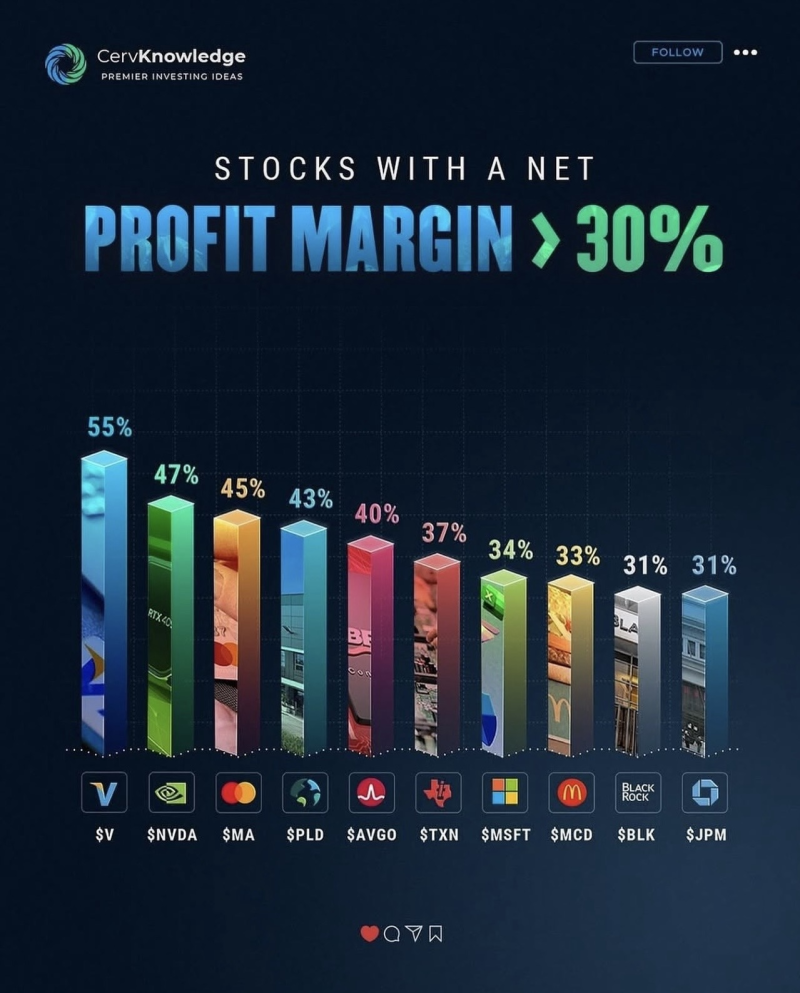Only a handful of companies manage to consistently post net profit margins above 30%. These margins signal exceptional efficiency, strong pricing power, and business models built to last. Recently, Stock Sharks shared data from Cerv Knowledge highlighting the top performers in this elite category.
The Top 11 Profit Leaders

- Visa ($V) leads with an impressive 55% margin, thanks to its scalable, low-cost payment infrastructure that processes transactions with minimal overhead.
- Nvidia ($NVDA) follows at 47%, benefiting massively from surging AI demand and GPU sales.
- Mastercard ($MA) sits at 45%, leveraging its global payments network.
- Prologis ($PLD) reaches 43%, riding the e-commerce wave through logistics real estate.
- Broadcom ($AVGO) maintains 40%, driven by custom silicon and AI semiconductor demand.
- Texas Instruments ($TXN) holds 37% with its diverse chip portfolio.
- Microsoft ($MSFT) achieves 34% through recurring cloud and software revenue.
- McDonald's ($MCD) posts 33%, demonstrating the power of franchising at scale.
- BlackRock ($BLK) stands at 31% as a global asset management leader.
- JPMorgan ($JPM) rounds out the list at 31%, showcasing its financial services dominance.
The data reveals something interesting: it's not just tech companies dominating this space. Logistics players like Prologis and consumer brands like McDonald's prove that exceptional profitability spans multiple sectors.
Why These Margins Matter
Companies operating above 30% margins typically enjoy significant competitive advantages. They've built scalable models that don't require proportional cost increases as revenue grows. Take Visa and Mastercard—once their networks are established, adding more transactions costs relatively little. Similarly, Microsoft's cloud and software subscriptions generate predictable revenue with manageable incremental costs.
These businesses also tend to weather economic storms better. When margins are this high, there's room to absorb pressure without sacrificing profitability. Investors often flock to these names during uncertainty, knowing they can maintain earnings even when conditions deteriorate.
The presence of AI-focused companies like Nvidia and Broadcom isn't surprising. They're riding a transformative wave that's reshaping technology infrastructure. Microsoft's position here reflects how it's successfully pivoted to cloud computing and AI integration. Meanwhile, companies like BlackRock and JPMorgan show that financial services, when done at scale, can be extraordinarily profitable.
What This Means for Investors
This group represents both growth potential and defensive stability. AI adoption continues accelerating, digital payments keep expanding globally, and consumer spending on established brands remains resilient. Companies like these tend to deliver outsized returns over time while providing downside protection during market turbulence.
For anyone building a portfolio focused on quality and sustainability, this list offers a solid starting point. These aren't speculative plays—they're proven profit generators with durable advantages that should persist for years to come.
 Peter Smith
Peter Smith

 Peter Smith
Peter Smith


